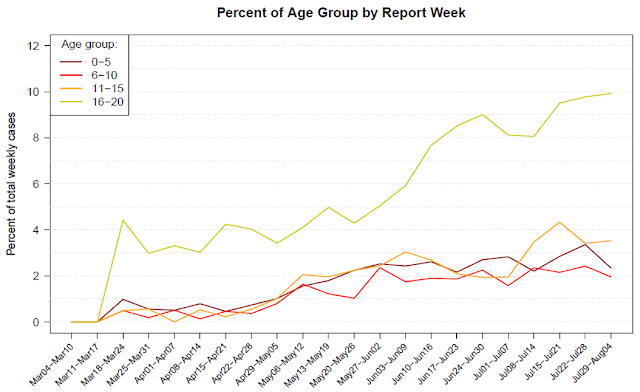As cases rise among young people, state will report how many there are at universities; 12 deaths for second straight day

Chart used by Health Commissioner Stack Aug. 6. He did not provide an update.
—–
By Mary Meehan and Melissa Patrick
Kentucky Health News
Gov. Andy Beshear announced Wednesday that Kentucky’s colleges and universities will be required to report coronavirus cases on campus just as other schools in Kentucky, and the state will publish the numbers.
Beshear said at his daily briefing that parents and people living in communities with universities have a right to know the level of infection. He said the information would also give health departments discern campus clusters from community spread.
The theme of infection among young people ran through the briefing. Beshear noted that of the 655 new coronavirus cases, 91 were under the age of 18, and five were 18-year-olds in Warren County, where the county and Bowling Green school systems plan to open Monday. He said several other counties also had cases of school-age children.
There was some slightly good news in the data. The share of Kentuckians testing positive for the virus in the last seven days is 5.4%, the lowest in two weeks.
“Losing 24 people over the last two days, that’s very serious to me,” he said, adding that Kentuckians need to realize the severity of the virus. He said it has killed more of them than in several wars, and they must be committed to doing the right thing and making smart choices.
“There’s a bad disease out there. We have no vaccine, cure or treatment,” said Stack, a physician. “When it hits people, it hits them hard.”
The fate of many high-school sports is to be decided at 10:30 a.m. Thursday during a special meeting of the Kentucky High School Athletic Association Board of Control. Jared Peck reports for the Lexington Herald-Leader that the board will discuss whether to shift or alter seasons as the pandemic worsens. Fall sports are set to begin normal practice Aug. 24. Soccer, volleyball, field hockey and cross country would begin play as soon as Sept. 7. Football games would kick off Sept. 11.
Data debate: State Senate President Robert Stivers said at a Senate Republican event that Stack and the state’s chief epdemiologist, Douig Thoroughman, told a legislative committee last week that they don’t know if the data they release about the coronavirus is accurate. “Think about that,” Stivers said. Are we creating false senses of security if they’re reported too low?”
Thoroughman told the Program Review and Investigations Committee that the positive-test rate isn’t perfect because some testing labs don’t report negative results, but the rate is reported “because there is a huge clamoring for it.” He also said the state has found a need to show more accurate figures than those reported by the federal government, which are generally 2 to 3 percentage points higher because it misses many negative cases due to the different ways labs can report. Also, Stack has said the federal numbers include all positive tests for the same person, but the state “de-duplicates” them.
Beshear, asked about Stivers’ remark, said the state takes steps to ensure the data is accurate, but some people are intent on maintaining the skepticism. “You got data from us that shows we are in a concerning place, you’ve got data from the White House, that is similar so I guess the Senate president disagrees with the Trump administration,” he said.
- Beshear announced that the state is applying for a federal grant to extend additional unemployment assistance. He said the jobless will receive $400 on top of their regular benefits, retroactive to July 26, when the original $600 weekly bonus benefit ended. The grant will cover three weeks of benefits, he said, but because of complications in obtaining and releasing the money, people likely won’t see a check until early September.
- The Washington Post reports a growing movement challenging anti-maskers: “In a country stumbling to control a rampant and deadly virus, masks are effective and popular weapons. Three-quarters of Americans favor requiring people to wear face coverings in public to stop the spread of the novel coronavirus, including 89 percent of Democrats and 58 percent of Republicans, according to an Associated Press-NORC Center for Public Affairs Research poll in July.” The story notes that while majorities support masks, anti-mask forces have been much more vocal.
- The Herald-Leader reports on what it’s like for kids with covid-linked multisystem inflammatory syndrome, with one parent saying it was like a trip “through hell.” . Last week, Thoroughman told the legislative panel that seven Kentucky children have been diagnosed with this syndrome, but none have died from it.
- “The World Health Organization warned Tuesday that young people are becoming the primary drivers of the spread of the novel coronavirus in many countries, a worrisome trend experts fear may grow in the United States as many colleges and schools begin to reopen,” William Wan and Moriah Balingit report for the Post.
- Research from the Children’s Hospital of Philadelphia, published in the journal Clinical Infectious Diseases, looked at the association between the timing of emergency declarations and school closings, and found that each day of delayed intervention lead to a 5 to 6% increase in risk of death. “Our analyses demonstrate that states that issued emergency declarations earlier helped curb the spread of the disease. These results confirm how important it is to implement social distancing measures early to reduce covid-19 deaths.” lead author Nadir Yehya said in a news release.